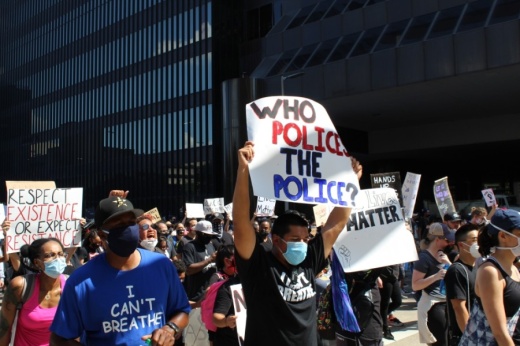Compared to Austin, Dallas, San Antonio and Fort Worth, Houston’s oversight process lacks transparency and favors influence from the Houston Police Department over outside investigators, according to the Nov. 19 report.
The loss of community trust in misconduct reviews can have long-lasting effects, the study found.
“Research suggests that an ineffective and opaque civilian oversight system may be worse than no oversight system at all,” it states.
To Karla Brown, an organizer with Houston Justice, the findings are not surprising.
“People have no faith in these boards doing what they are supposedly existing to do," she said. “If you ... ask the people, they will tell you the things that are going on in their communities with police, but when [police] know there is no one there to tap them on the wrist ... why would they improve or change?”
Houston’s board is made up of 20 members and one chair who review police misconduct investigations performed by the Houston Police Department’s Internal Affairs Division. The members, who are all unpaid volunteers, vote on whether internal affairs' assessment of a complaint is fair.
This model, known as a review model, is considered the least effective out of the models other Texas cities follow, the report stated.
In Austin, for example, an auditor’s office both investigates misconduct and researches department practices to make policy recommendations.
Former Houston Independent Police Oversight Board member Kristin Anderson resigned over the issue.
“[The independent police oversight board] reviews only completed files prepared by internal affairs. ... Because [the board] sees cases only at the conclusion of the internal affairs investigation, narratives and frames are already in place,” she wrote in her resignation letter.
Austin also has a $3.4 million budget dedicated to its oversight system, outpacing Dallas’ $545,000 budget and Fort Worth’s $690,000 budget, the study reported. Houston and San Antonio's systems have no dedicated budgets.
The cities with budgets use those to hire dedicated staff to conduct investigations rather than relying on unpaid volunteers and police department staff.
As a result, Houston’s board has less access to police department records than other cities, the report found. It is also one of the only accountability systems in the state to not have any say in policy recommendations, it stated.
Houston Mayor Sylvester Turner’s task force on policing reform has proposed numerous changes to the city’s current board, some of which are modeled after other cities’ initiatives. Turner told reporters Sept. 10 he is "99.999% certain there will be some adjustments" to the oversight board.





